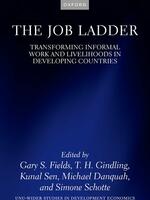Filter by...
Reset all
Publications (112)
Journal Article
– Evidence from Mexican municipalities
Part of Journal Special Issue
Clientelist Politics and Development
Journal Article
– Supply vs demand factors
THIS ARTICLE IS ON EARLY VIEW | This study estimates the relative importance of alternative supply and demand mechanisms in explaining the rise of female labor-force participation (FLFP) over the last 55 years in Mexico. The growth of FLFP in Mexico between 1960 and 2015 followed an S-shaped, with a...
Working Paper
pdf
Violent conflicts affect the lives and livelihoods of almost one quarter of the world’s population. But the effects of violent conflict are not uniform. This study assesses the differential effects of violent conflict on young people’s education, job prospects, and forms of civic engagement and...
Journal Article
This peer-reviewed research is available free of charge. UNU-WIDER believes that research is a global public good and supports Open Access.
– Evidence from Latin American countries
Part of Journal Special Issue
Women’s Work
Working Paper
pdf
We investigate the impact of childhood exposure to organized criminal violence on sociopolitical attitudes in Mexico, where an entire generation of youths has been raised amid the country’s most violent conflict over the past century. We fielded an in-person survey to nearly 3,000 urban youths...
Working Paper
pdf
– The role of oil theft and narcocracy and the electoral consequences of organized crime
When does organized crime resort to assassinating politicians? In narcocracies, criminal groups co-opt political elites through bribery in exchange for protection to traffic illegal drugs. When criminal groups compete, they may also resort to political violence to influence which candidate wins...

Government responsiveness is an integral feature of representative democracy. Its importance could be amplified in times of crisis, especially if citizens cannot rely on market actors for help. Governments can soften the impacts of negative shocks to the status quo, or exponentiate them by their...
Journal Article
This peer-reviewed research is available free of charge. UNU-WIDER believes that research is a global public good and supports Open Access.
– The nature of informal employment in urban Mexico
Part of Journal Special Issue
What sustains informality
Journal Article
This peer-reviewed research is available free of charge. UNU-WIDER believes that research is a global public good and supports Open Access.
– Evidence from Mexican informal and formal workers
Part of Journal Special Issue
What sustains informality
Working Paper
pdf
This paper analyses the land tenure reform that took place in Mexico in 1992 and its PROCEDE programme (Ejido Rights Certification Programme). It considers the counter-agrarian reform’s objectives, the context in which it was proposed, and the different actors involved. It delves into the main...
Working Paper
pdf
– Evidence from Mexican municipalities
Does clientelism perpetuate the weak state capacity that characterizes many young democracies? Prior work explains that clientelist parties skew public spending to private goods and under-supply public goods. Building on these insights, this article argues that clientelism creates a bureaucratic...
Working Paper
pdf
Voter coercion is a recurrent threat to pro-poor redistribution in young democracies. In this study we focus on Mexico’s paradigmatic Progresa-Oportunidades-Prospera (POP) programme. We investigate whether local mayors exploited POP to coerce voters, and if so, what effect these actions had on the...
Working Paper
pdf
There are sound theoretical reasons to expect clientelism to suppress economic growth: politicians who garner support by offering employment to voters and grassroots party members can do so more effectively when the voters’ participation constraint is met with low wages. Hence, clientelism can...
Blog
At the global level, gender gaps in labour force participation have narrowed and over half a billion women have joined the workforce in the last 30 years. However, there is enormous variation in women's labour force participation (FLFP) across low- and middle-income countries, and there is no clear...
Book Chapter
This peer-reviewed research is available free of charge. UNU-WIDER believes that research is a global public good and supports Open Access.
– Labour markets and fiscal redistribution 1989–2014
From the book:
Inequality in the Developing World
Displaying 16 of 112 results
 Join the network
Join the network